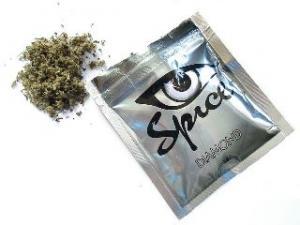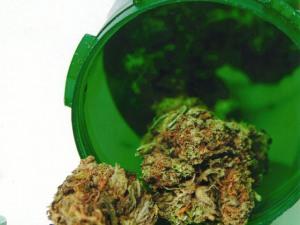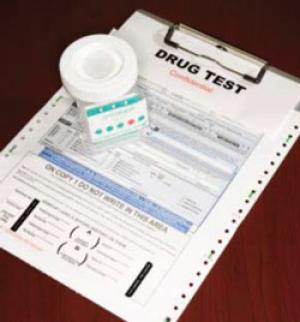Scandal in the Pinellas County, Florida, Sheriff's Office over its efforts to bust indoor marijuana growers is providing plenty of fodder for the sheriff's challengers this campaign season.
We review three books on various aspects of marijuana culture. There's some pretty good stuff there, too.
Nancy Pelosi said Wednesday she may be open to making changes in federal law surrounding medical marijuana. That's her strongest statement yet on the issue.
Federal prosecutors have targeted Harborside Health Center, California's iconic largest dispensary, with an asset forfeiture action. But Harborside isn't just going to roll over and play dead.
"Bath salts" and "fake weed" are now banned on federal law after President Obama signed into law the FDA safety bill to which the bans were attached.
DrugWarFacts.org, a publication of Common Sense for Drug Policy, is an in-depth compilation of key facts, stats and quotes on the full range of drug policy issues, excerpted from expert publications on the subjects. The Chronicle is running a series of info items from DrugWarFacts.org -- check them out!
Hard-line Singapore has announced it is modifying its mandatory death sentence for drug traffickers. It's just a small change, but it may save a few lives, and serve as a signal for other drug death penalty states.
Last week's middle of the week holiday made things fairly quiet on the medical marijuana front, but it looks like Massachusetts voters will have a chance to join the ranks of the medical marijuana states in November, and other efforts are underway in some surprising places.
It looks like Massachusetts has a good shot at becoming the 18th medical marijuana state. An initiative there has qualified for the ballot.
Oregon's OCTA marijuana legalization initiative has handed in a final 57,000 signatures. It needs 32,000 of them to be valid to make the November ballot. But election officials invalidated almost half of earlier signatures, so it's still nail-biting time for proponents.
Arkansas proponents for a medical marijuana initiative met a critical deadline last week, but still have thousands of signatures to gather if they're going to make the November ballot.
Georgia's governor was quick to sign a welfare drug testing bill into law, but now he wants to wait for a legal challenge to a similar law in Florida before implementing that law that was supposed to go into effect July 1.
The police in Ocean City, Maryland, are on a mission to maximize marijuana arrests, and they're doing quite well at it. Factor that in to your vacation plans.
In Corpus Christi, police have been arresting a thousand people a year on drug charges. That's the single largest reason people make it to felony court in Nueces County.
The criminal justice system in Volusia County, Florida, is running largely on the drug war if last Friday's jail bookings are any indication.
A former Missouri sheriff heads to federal prison, a former Kansas City cop is headed there, too, and a former South Carolina deputy is looking at drug charges.
Scandal has been brewing in the Pinellas County, Florida, Sheriff's Office over the possibly criminal misbehavior of some of its narcotics detectives, and Sheriff Bob Gualtieri, a Republican, has been trying to keep it from spinning out of control. But with his job on the line in November, his challengers, Republicans and Democrats alike, are making the scandal -- and the department's emphasis on busting marijuana grows -- issues with which to wound him in the campaign.

Narcotics deputies went above and beyond in their efforts to bust indoor marijuana grows (wikimedia.org)
Pinellas County sits on Florida's Gulf Coast and includes the city of St. Petersburg. For the last few years, it has been an epicenter of the state's prescription
opioid epidemic, but despite the county leading the state in
Oxycontin overdose deaths, some Pinellas County narcs were more interested in pot growers than pill mill merchants.
[Editor's Note: At least one candidate for sheriff is challenging the conventional law enforcement narrative regarding opioid pain medications; see Scott Swope's comments on the topic at the end of this article.]
It all began when narcotics detectives with the sheriff's office hit on the bright idea of spying on a legal business -- a Largo hydroponics grow shop -- and taking down the license plate numbers of customers, and then snooping around to see what they could find. At least four detectives were involved in surveillance that apparently crossed the line into illegality by trespassing on private property without a warrant, by disguising themselves as utility company workers, and by subsequently falsifying search warrant affidavits (they would claim to have smelled marijuana from the street, when they had actually trespassed to find evidence).
They would have gotten away with it if not for tenacious defense attorneys. But things began to unravel last year, when the attorney for Allen Underwood, who had been arrested in a grow-op bust, filed a complaint saying that Underwood's surveillance cameras had recorded one of the detectives hopping over his fence. The detective ordered the surveillance video deleted, and the sheriff's office found no evidence of wrongdoing by its man.
Next, Largo defense attorney John
Trevena charged in a case that one of the detectives had donned a Progress Energy shirt and cap to gain warrantless access to a private property. The detective first denied it under oath, then admitted it. At the time,
Gualtieri attributed the deception to "over-exuberance" by a young detective.
Then, in February, Tarpon Springs attorney Newt Hudson questioned one of the detectives under oath about whether he ever saw his dope squad colleagues trespass. Under questioning, the detective admitted that he and one of the other detectives had once broken down a fence to enter a yard of interest.
"That was the game changer," Sheriff
Gualtieri told the
Tampa Bay Times last month as he announced he was launching a criminal investigation of the four detectives. "Misconduct will not be tolerated and we will hold accountable any member of the Pinellas County Sheriff's Office who acts contrary to the law,"
Gualtieri said. "The ends never justify the means."

Embattled Sheriff Bob Gualtieri (bobforsheriff.com)
Three of the detectives have resigned, and
Gualtieri fired the fourth, but it might be too late to undo the damage to local law enforcement and to
Gualtieri's own political prospects. At least 18 pending marijuana grow prosecutions have been halted, and
Gualtieri and Chief Assistant State Attorney Bruce Bartlett said they also will review charges against about two dozen other defendants who previously pleaded guilty, were convicted or accepted plea bargains.
And
Gualtieri has been repeatedly pummeled by challengers over the scandal. Not only the sole Democrat in the race, Palm Harbor attorney Scott
Swope, but
Gualtieri's Republican challengers, most notably former Sheriff Everett Rice, have criticized his handling of the affair. The Republican primary, which
Gualtieri hopes to survive, is set for August 14.
"They shouldn't have been investigating the store to begin with,"
Swope told the Chronicle. "As far as criminal activity is concerned, we have bigger fish to fry than trying to catch people who are purchasing grow lamps. It was absolutely ridiculous."
Especially given that the sheriff's office had had to cut $100 million from its budget and eliminate 600 positions, including the cold case unit and sexual predator tracking,
Swope said, alluding to the severe financial straits in which the department and the county found themselves.
"When I'm at a campaign presentation and tell people that they had detectives for
surveilling this business selling legal equipment, but not for human trafficking or cold cases, everyone hears that and goes 'wow,'"
Swope said. "It's an argument that has some traction."
Swope also criticized the leisurely pace of
Gualtieri's internal investigation.
"The internal investigation took way too long," said
Swope. "When you have an assertion that one of your detectives is trespassing to obtain evidence, falsifying ID to obtain evidence, falsifying affidavits, then destroying evidence, that needs to take precedence over every other internal investigation, and it didn't. When
Gualtieri first went on the record, he said he didn't believe it; he just dismissed it, at least initially."
For Rice, who served as sheriff for 16 years until 2004, the pot grow scandal was an indication of misplaced priorities in
Gualtieri's department.
"How is it that Pinellas and Pasco County became the pill-mill capital of the world in the last three or four years," Rice asked at
a candidates' forum this spring, "and meanwhile we're spying on people who have
hydroponic materials?"
Rice was still on the attack last month, telling the
Tampa Bay Times that problems in the department are not limited to the pot grow scandal, but also include reports of slipshod internal investigations, narcotics sergeants claiming pay while monitoring detectives from home, and possible thefts.
"The question is,'' said Rice, "how did that culture come about in the first place? I think people realize that a Sheriff Rice wouldn't put up with such things,'' Rice said.
Except that he did. During his time in office, one of Rice's narcotics detectives gathered evidence of a pot grow illegally and lied about it under oath. He also fabricated evidence for a search warrant by calling in his own "anonymous tip." In another case, deputies used an informant to get a search warrant without revealing that the informant's wife was having an affair with the suspect. Pinellas judges tossed a number of pot grow cases over police misconduct during Rice's reign, and one detective was prosecuted for perjury.
One of the cases tossed was against Randy
Heine, a Pinellas Park smoke shop owner. In that 1997 bust, deputies raided
Heine's home and seized two pounds of pot, but a judge threw out the case, finding that deputies had resorted to "gross, material misrepresentation of the facts'' in their search warrant application.
Heine, a perennial gadfly on the local scene,
has also become a harsh critic of Pinellas-style drug law enforcement. He was briefly a candidate in the sheriff's face before dropping out after failing to pay a filing fee. That leaves
Swope,
Gualtieri, and Rice.

Democratic challenger Scott Swope (swopeforsheriff.com)
For
Swope,
Gualtieri and Rice are birds of a feather -- traditional lawmen who don't think twice about the futility and expense of continuing to fight the war on marijuana. He offers a different vision, one that includes marijuana decriminalization and, eventually, legalization and regulation.
"Florida should go the way of more than a dozen other states and decriminalize," he said. "Then the sheriff's office wouldn’t have to expend limited resources trying to catch people in possession of small amounts. That would make it so those young people don't have a criminal record, they're still eligible for student loans, they can get jobs. It's a bit of a shocker for some of my audiences, but when you think about it, it makes perfect sense to save tax dollars by not investigating and prosecuting possession of small amounts."
A marijuana bust of 20 grams or less is a misdemeanor in Florida, but it means a trip to jail, booking, and waiting to get bonded out. It also uses up law enforcement man-hours during arrest, booking, detention, and prosecution. Florida should and will decriminalize eventually,
Swope said, but he wouldn't wait for the legislature to act if elected.
"As sheriff, I can't tell the legislature what to do, but I would have some influence over the county commission. I could lobby them to enact an ordinance making possession of less than 20 grams an ordinance violation," he explained. "That way, instead of deputies having to arrest people and put them in the criminal justice system, they could just issue an ordinance violation ticket, and the fines would go to Pinellas County.
Swope was philosophically open to legal, regulated marijuana sales, but wasn't pushing it as a campaign position. First things first, he said.
"From the perspective of this campaign, the majority of the population believes medical marijuana should be legal, and I do, too," he explained. "Decriminalization and regulation similar to alcohol and cigarettes, well, that's a bit more of a progressive position. I think it's going to be a two-step process: Make medical marijuana legal, and after enough time, and people realize these folks aren't committing crimes, then it's time for step two."
Swope also had an interesting perspective on the pain pill and pill mill issue.
"Pinellas County had a very serious problem with pain pills, we led the state four straight years in
Oxycontin deaths, and it's still a serious problem, but unfortunately, when they really ramp up the pain pill mill enforcement, the pendulum can swing too far the other way," he noted. "There is a potentially serious negative impact on doctors and pharmacies trying to help people who need the help. If Florida were a little more progressive and had a medical marijuana law, perhaps many could treat themselves with that instead of narcotics."
The one-time deputy's drug war positions are winning him support outside of traditional Democratic constituencies, including Libertarian Party figures ranging from county stalwarts to presidential nominee Gary Johnson.
"I have the endorsement of the Libertarian Party here, and that has some of the Democrats scratching their heads. I just explain that I'm a lawyer familiar with the Constitution, I'm progressive-thinking and understand and appreciate the value of personal liberty and what the Constitution means and I will make damned sure the sheriff's office abides by the Constitution."
Pinellas County has 3,000 more registered Democrats than Republicans, but most county offices, including the sheriff's, have been in Republican hands for decades. A victory for Democratic challenger Scott
Swope in November would not only break the GOP's stranglehold on elected office in Pinellas, it could also bring a fresh new perspective to Florida law enforcement.
Meanwhile, Sheriff
Gualtieri has just
unleashed an offensive against "fake pot."
(This article was published by StoptheDrugWar.org's lobbying arm, the Drug Reform Coordination Network, which also shares the cost of maintaining this web site. DRCNet Foundation takes no positions on candidates for public office, in compliance with section 501(c)(3) of the Internal Revenue Code, and does not pay for reporting that could be interpreted or misinterpreted as doing so.)back to top
Heart of Dankness: Underground Botanists, Outlaw Farmers, and the Race for the Cannabis Cup by Mark Haskell Smith (2012, Broadway Paperbacks, 235 pp., $14.00 PB)
Pot Farm by Matthew Gavin Frank (2012, University of Nebraska Press, 223 pp., $14.95 PB)
Pot, Inc.: Inside Medical Marijuana, America's Most Outlaw Industry by Greg Campbell (2012, Sterling Publishers, 262 pp., $22.95 HB)
Marijuana is going mainstream. This year alone the weed and our relationship to it will be the subject of dozens of new titles ranging from dry policy discussions to zonked-out memoirs, and that's not even counting the unending stream of how-to-grow books, for which there appears to be an infinite appetite.
And while Drug War Chronicle is into the serious policy wonkery -- look for a review of Kleiman et al's Marijuana Legalization: What Everyone Needs to Know on Friday -- we also just enjoy good reads about one of our favorite subjects. And all three titles reviewed here provide that, each in its own way and each with its own emphasis.

In
Heart of Dankness, Mark Haskell Smith embarks on a smoke-filled quest for "the dank," that special weed possessing the superior smell, taste, appearance, and high that are the hallmarks of dankness. That quest leads from Amsterdam, where covering the Cannabis Cup for the Los Angeles Times led Smith into the underground world of pot cultivation, back to Los Angeles, as well as connoisseur pot grows in the Sierra Nevada, seed breeders in the San Fernando Valley, and activists in the Bay Area (hello, Debbie
Goldsberry!) before ending where it all began, back in Amsterdam at the Cannabis Cup.
Heart of Dankness is rollicking reefer romp through the marijuana demimonde, from thuggish medical marijuana dispensaries in Eagle Rock to pristine botanical labs where the pursuit of dankness is the end all and be all. Readers will not only have a good time with Smith's prose, they will also get a sense of the science (and art) behind those killer strains developed by the obsessed, sometimes egotistical, masters of the art.
Pot Farm is a little different, but still fascinating and educational. In it, Matthew Gavin Frank and his wife take a break after spending eight months helping his mother recover from a bout with cancer -- by going to work on an apparently industrial-scale medical marijuana grow in Mendocino County. They are there for the duration, living miles from civilization on a remote farm owned by Lady Wanda, the massive, elusive, wealthy, and well-armed businesswoman behind
Weckman Farm and its massive grow operation. How massive? Well, Lady Wanda has tents for up to 60 people, she has a pair of chefs to feed the crew, she has an on-site, full-time masseuse (Frank's wife), she has a full-time maintenance man and a fleet of vehicles. It's a big operation.
Who ends up working on a pot farm at the end of a dirt road in the middle of nowhere? Some pretty strange cats is who, Frank finds. Pseudo-hippie kids, ex-alcoholics and drug addicts, alternative healers, former soldiers perched high in the redwoods serving as armed guards and lookouts, all are among the eccentric cast of characters. All of them, Frank included, spend plenty of time stoned out of their minds on the product they're producing, too.
And then there are the patients. The ones Frank describes who work alongside him on Wanda's farm ring true to me. One patient couple, the woman desperately ill, the man a little crazed, become part of Frank's crew of close comrades, praising the healing power of the herb and denouncing the authorities, but seem to have only an addled idea of the nuts and bolts of the medical marijuana politics that fills their lives. The woman dies in a Sacramento motel room after she and her partner go there to lobby for a bill.
Or perhaps, it's not their idea of medical marijuana politics that is a bit addled, but Frank's. The process in California is complex and confusing; Frank doesn't help matters by referring to both propositions and legislative bills as propositions. Still, even if he gets a
wonky detail or two wrong, he has succeeded in drawing an engrossing portrait of a real life medical marijuana farm, with all its sweat and smoke.
Pot, Inc.'s Greg Campbell was a stereotypical Deadhead college student, stoned out of his mind all the time. But that was 20 years ago. Now, he's a middle-aged family man living in Denver who hadn't smoked in years, but noticed a couple of years ago that the medical marijuana industry was taking off in Colorado and decided to see just what it was all about. As the Great Green Rush exploded there in 2009 and 2010, Campbell signed up as a patient, went to pot school to learn how to grow, produced his own basement crop (replete with the requisite paranoia), then tried to sell it.
Campbell tells the tale of his adventures in the medical marijuana business, interspersing it along the way with forays into the roots of marijuana prohibition and the politics of pot in Colorado and the nation. Originally a skeptic about the health claims for marijuana, along the way he finds an entire subculture of patients and providers for whom recreational use is irrelevant and for whom the medical benefits cannot, in his estimation, be denied.
It's a sign of how far the conversation about marijuana has advanced that none of the authors of the books reviewed here are wondering
whether pot should be legalized, but are instead wondering why the hell it hasn't been already. To varying degrees, all three books delve into the Reefer Madness and fear-mongering at the root of pot prohibition, but those are more attempts to explain the unexplainable than legalization manifestos.
One thing that's worth noting is how the actuality of medical marijuana opened the door to the marijuana subculture for all three authors. Sure, Smith was covering the Cannabis Cup in Amsterdam, but when he got serious about writing his book, the first thing he did was go to a pot doc and get a medical marijuana card. Frank worked on an actual medical marijuana farm. And Campbell, too, got the doctor's note.
I don't think they're unrepresentative in that respect. Medical marijuana in relatively wide-open states like California and Colorado has provided countless people entrée into the dank world of weed. (If I recall correctly, both Smith and Campbell went, with some trepidation, with the old standby "chronic pain," but easily got their recommendations.) All three authors agree that marijuana has medicinal applications that have eased the lives of thousands of patients. Whether that was really the case for them personally, or is the case for all those bong-pulling 20-something hacky sack players, I don't know or care. medical marijuana deserves to be legal in its own right, but if it ends up exposing more people to cannabis culture and allows more people to buy weed without fear of legal problems, more power to it.
If you're looking for some not-too-heavy pot-related reading this summer, we have three winners. Check 'em out.
back to top
House Minority Leader Nancy Pelosi told a bloggers' roundtable Wednesday that Democrats might be interested in making changes in federal law around medical marijuana after the November elections, Raw Story reported.

Pelosi and President Obama in happier times (wikimedia.org)
"I've been very clear on the subject of medical marijuana over time, in committee and on the floor as leader," Pelosi said. "I think that it would be really important to do that," she said.
"It would be hard for anyone to agree with the fact that someone who has HIV/AIDS or has cancer and they find relief from pain in medicinal marijuana that should be something that should be a priority to raid on the part of the Justice Department. Going along with that, we need to address some of the penalties for any nonviolent crimes that are out there."
Pelosi has previously attacked the Obama administration for the Justice Department's campaign of raids and threats against California medical marijuana providers, but this is her strongest statement yet on the topic.
Federal law and the Justice Department do not recognize medical marijuana, but there are options short of revising the Controlled Substance Act that could bring relief. The Justice Department could be persuaded to go back to the policy it adopted early in the Obama administration of not going after providers in compliance with state laws, or the administration could reschedule marijuana.
Another possibility is a ban on federal spending for raids on state-sanctioned medical marijuana facilities. But a bill that would do that was defeated in the House in May. A third alternative is for the administration to simply use its executive authority to reschedule marijuana for prescription availability under the Controlled Substances Act.
"Medical marijuana is one of those issues where if you get enough states, where when you get enough then you get it," Farr told Raw Story. "California had already started that process because of cost concerns. That didn't cause any scandals or upheavals."
Whether Pelosi's words will lead to any real change remains to be seen, but the most powerful Democrat in the House has just put the administration on notice that she's not happy with its medical marijuana policies.
back to top
Harborside Health Center, California's largest and most well-known medical marijuana dispensary, has been targeted for closure by federal prosecutors. Workers at the dispensary's home base in Oakland and at its second store in San Jose found complaints from US Attorney Melinda Haag's office taped to their doors when they came to work Monday morning.
The complaints inform
Harborside that federal prosecutors have filed lawsuits seeking to seize the properties where it operates under federal asset forfeiture laws.
In the past year, federal prosecutors in California have undertaken a concerted campaign against dispensaries, sending out more than 300 letters to dispensaries or landlords threatening asset forfeiture or criminal prosecution or both. More than 400 dispensaries have closed their doors during that same period, many of them because of the federal threats.
If
Harborside is going to join that list, it won't be without a fight.
"
Harborside has nothing to hide or be ashamed of," said executive director Steve
DeAngelo in a prepared statement. "We will contest the DOJ action openly and in public, and through all legal means at our disposal. We look forward to our day in court, and are confident that justice is on our side."
Harborside maintains that it has complied with all local and state laws and that it was not within 1,000 feet of a school, another rationale the Justice Department is using to target dispensaries even though state law is set at 600 feet.
Shutting down
Harborside would be a major blow to Oakland. The dispensary employs over a hundred people there and is the city's second largest retail tax payer. Of more than $3 million in combined taxes paid by
Harborside last year, more than a million went to the city.
"The claim by the Obama Administration that it's not undermining the laws of medical marijuana states like California is becoming less and less tenable," said Don Duncan, California Director of
Americans for Safe Access, the country's leading medical marijuana advocacy group. "The Attorney General and the president must be held accountable for actions by their U.S. Attorneys that are harming untold numbers of patients."
Harborside and its supporters are gathering their forces for what promises to be a long and bruising battle with the Justice Department. This story is just getting underway.
back to top
President Barack Obama Monday signed into law a bill banning the synthetic drugs known popularly as "bath salts" and "fake weed." The language barring the substances was inserted into the Food and Drug Administration safety bill passed last month by the Congress.

Bye-bye Spice, hello...? (wikimedia.org)
The bill targets 31 specific synthetic stimulant,
cannabinoid, and hallucinogenic compounds. Marketed under brand names like K2 and Spice for synthetic
cannabinoids and under names like Ivory Wave, among others, for synthetic stimulants, the drugs have become increasingly popular in recent years.
With their rising popularity came rising reports of emergency room visits and poison control center calls attributed to the drugs. Synthetic
cannabinoids have been linked to symptoms similar to those suffered by people who sought medical help after smoking marijuana, while the adverse reactions reported by "bath salts" users have been more serious.
More than half the states and numerous localities have moved to ban some of these new synthetics, and the DEA placed both groups of substances under an emergency ban until Congress acted.
Congressional advocates of the prohibitionist approach to new synthetics were pleased.
"President Obama's swift approval of this federal ban is the final nail in the coffin for the legal sale of bath salts in smoke shops and convenient stores in New York State and throughout the rest of the country," said
Schumer in a
press release (which also includes a complete list of the 31 banned substances). "This law will close loopholes that have allowed manufacturers to circumvent local and state bans and ensure that you cannot simply cross state lines to find these deadly bath salts, and I'm pleased that after a great deal of effort, it has become law. We have seen bath salts catalyze some of the most heinous crimes in recent months across Upstate New York, and the President's signature ensures that the federal government can fight this scourge with a united front, across state lines and at our borders."
Schumer used the occasion to take a jab at Sen. Rand Paul (R-KY), who had placed a senatorial hold on the bill, blocking it for months over his concerns about mandatory minimum sentences before removing the hold after the bill's sentencing structure was modified.
Schumer gloated that Congress passed the bill "over the strenuous objections" of Paul.
While
Schumer and his colleagues claimed the bill will suppress the new synthetics, others were not so certain.
New York state anti-synthetic activist Deirdre
Canaday, whose 26-year-old son Aaron Stinson died last year after smoking a form of fake weed called Mr. Nice Guy, told
a local TV news station the ban addressed only a handful of potential new synthetic drugs.
"I think if the American public isn't careful, they'll think this issue has been addressed when this is really just the tip of the iceberg," she said. "By specifically labeling chemical compounds, they are creating an open door for these basement and garage chemists to create analogs, which is branching out from the original compound, and differing just slightly, and it still has the same effect," said
Canaday.
back to top
Did you know that addicts receiving heroin legally in Switzerland's heroin maintenance programs stabilize their use, improve their health, and desist from criminal acts? Read about it in the Heroin Maintenance section of DrugWarFacts.org.
DrugWarFacts.org, a publication of Common Sense for Drug Policy (CSDP), is an in-depth compilation of key facts, stats and quotes on the full range of drug policy issues, excerpted from expert publications on the subjects. The Chronicle is running a series of info items from DrugWarFacts.org, and we encourage you to check it out.
Check back at Drug War Chronicle for the final installment in this six-part series, and sign up for the DWF new facts RSS feed. Read last week's Chronicle DrugWarFacts.org blurb here.
Common Sense for Drug Policy is a nonprofit 501(c)(3) organization dedicated to reforming drug policy and expanding harm reduction. CSDP disseminates factual information and comments on existing laws, policies and practices.

back to top
Singapore, once famously called "Disneyland with the death penalty" by author William Gibson, will move to relax the imposition of mandatory death sentences for drug traffickers. The wealthy Southeast Asian city-state's deputy prime minister said Monday the government will produce a draft law by year's end that will give judges more discretion in some drug trafficking and murder cases, Reuters reported.

Singapore (wikimedia.org)
Singapore, which was been ruled by the same party since 1965, is a notoriously crime-averse society that subjects even minor offenders to punishments including caning. It has a zero-tolerance policy toward drugs. Amnesty International and other human rights groups estimate it has hanged hundreds of people, including dozens of foreigners, for drug offenses since 1990.
Singapore has a mandatory death sentence for anyone found guilty of importing, exporting or trafficking in more than 500 grams of cannabis, 200 grams of cannabis resin or more than 1,000 grams of cannabis mixture; trafficking in more than 30 grams of cocaine; trafficking in more than 15 grams of heroin; and trafficking in excess of 250 grams of methamphetamine The mandatory death penalty for drugs was introduced in a 1975 Amendment to the Misuse of Drugs Act 1973 and was subsequently broadened.
But given the evolution of "our society's norms and expectations," the government will introduce the reforms, Deputy Prime Minister
Teo Chee Hean told parliament. "While there is a broad acceptance that we should be tough on drugs and crime, there is also increased expectation that where appropriate, more sentencing discretion should be vested in the courts."
But not too much discretion. Escape from the mandatory death penalty would only be available to low-level couriers or those who have mental issues,
Teo explained. The drug courier would have to show that he had no other role in supply or distribution.
"We also propose to give the courts the discretion to spare a drug courier from the death penalty if he has a mental disability which substantially impairs his appreciation of the gravity of the act, and instead sentence him to life imprisonment with caning,"
Teo said.
It's not that the government is going soft,
Teo emphasized. "In particular, the mandatory death penalty will continue to apply to all those who manufacture or traffic in drugs -- the kingpins, producers, distributors, retailers - and also those who fund, organize or abet these activities," he said.
In 2010, the
International Harm Reduction Association's Death Penalty Project identified Singapore as one of the nations highly committed to the use of the death penalty for drug offenses. Also included in that category are China, Iran, Saudi Arabia, Vietnam, and Malaysia. Another 26 countries, including the US, either actually execute some drug offenders or have laws on the books allowing for their execution.
But Singapore has been slowly shifting. While its customs forms still bluntly warn incoming travelers of "death for drug traffickers," the government has suspended all executions since it began a review last year.
Perhaps those other "highly committed" drug offense death penalty states will take notice.
back to top
Last week's middle of the week holiday made things fairly quiet on the medical marijuana front--at least until Wednesday--but it looks like Massachusetts voters will have a chance to join the ranks of the medical marijuana states in November, and other efforts are underway in some surprising places. Let's get to it:
National
On Wednesday,
House Minority Leader Nancy Pelosi suggested possible post-election action on medical marijuana."I've been very clear on the subject of medical marijuana over time, in committee and on the floor as leader," Pelosi said to a roundtable of bloggers, Raw Story reported. "I think that it would be really important to do that," she said. "It would be hard for anyone to agree with the fact that someone who has HIV/AIDS or has cancer and they find relief from pain in medicinal marijuana that should be something that should be a priority to raid on the part of the Justice Department. Going along with that, we need to address some of the penalties for any non-violent crimes that are out there." Pelosi has previously attacked the Obama administration for the Justice Department's campaign of raids and threats against California medical marijuana providers, but this is her strongest statement yet on the topic.
Arkansas
Last Thursday,
petitioners handed in signatures for a medical marijuana initiative. The group
Arkansans for Compassionate Care needs 62,507 valid signatures to qualify for the November ballot. They handed in 67,885 last Thursday. State election officials will do a "rough count" of the signatures to ensure that proponents have handed in at least the minimum number necessary to qualify for the ballot. While officials validate the signatures, proponents can continue to collect new signatures up to a 30 day deadline. They say they hope to gather another 40,000 or so just to be on the safe side.
California
Last Monday,
petitioners for a Solana Beach dispensary initiative handed in signatures. The group
Citizens for Patients' Rights handed in 1,600 signatures, almost ensuring the measure will qualify for the ballot. They only need 807 valid signatures. Once the measure is qualified, the city council will vote on whether to enact it directly or put it to a vote of the people. The council must act by August 10 for the measure to make the November ballot. Proponents have formally requested a special election if that deadline is not met. The proposal would allow nonprofit dispensaries in the municipality of
Solana Beach, providing they are in full compliance with the zoning, licensing and operating standards included in the initiative.
Last Thursday,
an effort to recall Redding City Council members failed. Medical marijuana advocate Rob McDonald undertook the effort in response to the city's ban on dispensaries, but came up far short of the 9,000 signatures needed to force a recall. Still, he said he was sending a message to politicians that their actions can have repercussions.
Last Saturday,
Kern County's Measure G restricting dispensaries went into effect. The voter-approved measure will regulate how and when dispensaries can operate. It will even limit what a pot shop can sell. Dispensaries in unincorporated parts of the county will have to be located in a heavy or light industrial area and can't be within a mile of another dispensary, a church, school, or park. They can only be open from 10:
00am to 8:
00pm, and they can't sell edibles, pipes, or other marijuana-related products. The measure will affect 26 dispensaries, but it's not clear yet just how.
On Monday,
Harborside Health Center announced it had been targeted for closure by federal prosecutors.
Harborside is probably the largest dispensary on the planet and is well-respected locally, but had already been the target of the feds via an Internal Revenue Service investigation. This time, US Attorney Melinda Haag has threatened to seize the
Harborside home base in Oakland as well as its sister store in San Jose. Employees found complaints taped to the front doors of the two locations Monday.
Also on Monday,
Lake County supervisors adopted a compromise medical marijuana ordinance after a contentious day-long hearing before a crowd of hundreds. The ordinance is an interim measure while the county hammers out long-term rules. Growers responded in force to an earlier proposal for restrictive pot limits, developed in response to a spike in marijuana cultivation and complaints from non-growing residents about the stench from the plants, scary guard dogs and armed growers. The board compromised and loosened the restrictions. As adopted, the temporary ordinance allows up to six mature plants on parcels smaller than a half acre. The amount increases with the acreage and is capped at 48 plants for cooperatives with access to more than 40 acres.
On Tuesday,
Yuba County supervisors suspended an ad hoc committee formed to discuss issues with medical marijuana growers. The move came after growers last week filed a lawsuit challenging the ordinance approved by supervisors earlier this year. Plaintiffs filed a civil complaint asking the ordinance to be thrown out, claiming, among other things, a lack of clarity on collective and cooperative grows could deny some users their prescriptions. The plaintiffs have also said they plan to file for a temporary injunction today in Yuba County Superior Court to prevent the ordinance from being enforced. Supervisors announced they had voted 5-0 during their closed session to refer the suit to outside counsel. Under the ordinance, medical marijuana cardholders are limited in how many plants they can grow by the size of the parcel on which they live, with additional requirements to shield the plants from public view.
Also on Tuesday,
Americans for Safe Access filed a friend of the court brief in the Charlie Lynch case. Lynch ran the Central Coast Compassionate Caregivers dispensary in
Morro Bay that had support from local officials, but was raided by the DEA in 2007. He was convicted in federal court of marijuana trafficking and sentenced to a year and a day in federal prison in 2009. His appeal should get a hearing later this year.
Colorado
Last week,
two Colorado Springs dispensary operators filed a lawsuit against the state charging that the Department of Revenue has failed to clarify a key rule about when dispensaries can begin growing for patients. In the lawsuit, filed on behalf of Michael Kopta and Alvida Hillery, the plaintiffs ask that the department be ordered to clarify when in a patient's state approval process designated caregivers can begin growing for them. Kopta and Hillery were arrested on marijuana cultivation charges earlier this year, but said they thought they were acting in accordance with the law.
Delaware
Last Thursday,
the Department of Health and Social Services began accepting applications for medical marijuana ID cards. The move came after the department finally finalized regulations for the program. While the regulations do not contain specific rules for dispensaries, there is space for them to be drafted in the future. Gov. Jack Markell (D) suspended implementation of the dispensary program after getting a threat letter from the US Attorney for Delaware, Charles Oberly III.
Kentucky
Last Thursday,
a state senator said he would reintroduce a medical marijuana bill and name it in honor of longtime Kentucky hemp and marijuana activist Gatewood Galbraith, who died in January. Sen. Perry Clark (D-Louisville) had introduced a similar bill last year. It went nowhere then, and Clark said he doesn't expect much different next year.
Massachusetts
Last Tuesday,
a spokesman for the secretary of state said a medical marijuana initiative had qualified for the ballot. Advocates had earlier gathered 80,000 signatures, putting the issue before the legislature. When the legislature failed to act, advocates needed to gather an additional 11,000 signatures to get the measure on the November ballot. Sponsored by the Committee for Compassionate Medicine, the initiative allows patients with specified medical conditions "and other conditions" to possess up to a 60-day supply of marijuana. Patients or their caregivers would have to obtain their medicine from one of up to 35 non-profit dispensaries or "medical marijuana treatment centers" and would not be able to grow their own unless they qualified under a hardship provision. Patients, caregivers, and dispensaries would be registered with the state.
Montana
As of the end of June,
medical marijuana patient numbers were stabilizing. The number of cardholders was at 8,681, down only slightly from 8,734 at the end of May. The numbers had been in a free-fall after peaking at 30,036 in June 2011. That month, the legislature essentially gutted the medical marijuana program, making it much more difficult to buy and sell it. Federal raids also played a role. The number of caregivers also declined slightly from 400 in May to 390 in June. That's less than 10% of the number of caregivers in March 2011, when the figure stood at 4,848.
Nevada
As of the end of June,
the number of medical marijuana patients was increasing dramatically. The state Health Division reported that 3,430 held medical marijuana cards, up by nearly a third over last year. That number could go even higher if the legislature next year passes a bill to allow dispensaries to operate in the state.
back to top
Voters in Massachusetts will have the chance to decide in November whether to legalize the medicinal use of marijuana. A spokesman for Secretary of State William Galvin said last Tuesday that proponents had successfully delivered the 11,000 additional signatures necessary and the measure had qualified for the ballot.
Earlier this year, proponents had gathered some 80,000 voter signatures so that if the legislature failed to act on pending medical marijuana bills -- and it did fail to act -- by May 1, they only needed the additional 11,000 to take the issue directly to the voters.
Sponsored by the
Massachusetts Patient Advocacy Alliance, the
initiative allows patients with specified medical conditions "and other conditions" to possess up to a 60-day supply of marijuana. Patients or their caregivers would have to obtain their medicine from one of up to 35 non-profit dispensaries or "medical marijuana treatment centers" and would not be able to grow their own unless they qualified under a hardship provision. Patients, caregivers, and dispensaries would be registered with the state.
[Update: The official initiative campaign is now online as The Committee for Compassionate Medicine (CCM). Mass. Patients will continue as an advocacy group after Election Day.]
If the initiative wins at the polls in November, it will be the latest move in a trend that is seeing the Northeast become nearly as medical marijuana-friendly as the West. New England neighbors that already have medical marijuana laws include Connecticut, Rhode Island, and Vermont, while in the Mid-Atlantic, New Jersey and Washington, DC, also have full-fledged medical marijuana laws and Maryland offers an affirmative defense.
Currently 17 states and DC have legalized medical marijuana.
back to top
Oregon could well be the third state to end up with a marijuana legalization initiative on the ballot after supporters of the Oregon Cannabis Tax Act (OCTA) said they had handed in more than 165,000 signatures by last Friday's deadline. Marijuana regulation and legalization initiatives have already qualified for the ballot in Colorado and Washington.
The Oregon measure needs 87,000 valid signatures to qualify for the ballot.
"We believe we are going to make it easily," said
OCTA chief petitioner Paul Stanford at a Salem news conference Friday morning.
But it's still nail-biting time as state election officials can take up to a month to validate signatures, and they have already invalidated signatures handed in earlier at a record rate. At the end of May,
OCTA turned in 108,000 signatures, only to have nearly half of them invalidated, a shockingly high percentage of
disqualifications.
With only 55,000 valid signatures from that first batch of 108,000, that means
OCTA has to come up with 32,000 valid signatures from that second batch of 57,000. If the same rate of invalidation holds, the measure will fall just short.
But last month,
Stanford told the Chronicle the
OCTA campaign had tightened up its signature gathering in the wake of the high invalidation rate on the early signatures. "We're screening our signatures much better now, we're checking in with every single petitioner. We're closely scrutinizing every incoming sheet," he said.
If
OCTA makes the ballot and is approved by voters in November, Oregon would regulate the cultivation and sale of marijuana to adults 21 and over. The measure would also legalize hemp production in the state.
A second marijuana effort, the
Oregon Marijuana Policy Initiative (
OMPI), would have asked Oregon voters to approve a state constitutional amendment to legalize personal cultivation and possession of marijuana. While it, too, appeared to have a good chance of qualifying earlier this year, it too suffered from record high signature invalidation rates.
Because it is a constitutional amendment, it faces a higher hurdle, needing 124,000 valid signatures to qualify. Chief petitioner Robert Wolfe told Reuters this week he did not expect
OMPI to make the ballot because of the high number of
disqualifications. He told the Chronicle last month he was contemplating legal challenges to the
invalidations.
In a month or less, we will know if
OCTA has qualified. We could end up with a Western weed legalization
trifecta for November.
back to top
Proponents of an Arkansas medical marijuana initiative handed in voter signatures by last Friday's deadline and now have an additional 30 days to gather more. They will need it.

Gabe, an Arkansas HIV patient who benefits from medical marijuana and would like his medicine to be legal (arcompassion.org)
needs 62,507 valid signatures to qualify for the November ballot. They handed in 67,885 on Thursday. Assuming an invalidation rate of 30%, which is not unusual, the group will likely have to come up with at least an additional 20,000 or so valid signatures or 30,000 raw signatures.
"Ultimately, we like to get another 40,000 or 50,000," campaign director Ryan
Denham told the
Associated Press.
State election officials will do a "rough count" of the signatures to ensure that proponents have handed in at least the minimum number necessary to qualify for the ballot. While officials validate the signatures, proponents can continue to collect new signatures up to the 30 day deadline.
The
Arkansas Medical Marijuana Act would allow up to 30 medical marijuana dispensaries in Arkansas, but cities and counties would be able to ban them. Patients would be able to possess up to 2.5 ounces of marijuana, but neither they nor their caregivers could grow it unless the patient resides more than five miles from a dispensary. In that case, the patient or caregiver could grow up to six plants.
The act would allow patients with specified diseases and conditions to register as medical marijuana patients with a doctor's recommendation. The state could add other conditions in the future.
back to top
Georgia's new welfare drug testing law was supposed to go into effect July 1, but that didn't happen. According to a spokesman for Gov. Nathan Deal (R), the governor still supports the law, but will hold off on implementation until a legal challenge against a similar bill next door in Florida is resolved.
The Florida law took effect last July, but was blocked by a federal judge in October. That case is expected to go before the 11
th US Circuit Court of Appeals.
Civil rights and civil liberties groups in Georgia said when the law was passed they would challenge it as soon as it is implemented. But they may not have to if the court, which has jurisdiction in Alabama, Florida, and Georgia, strikes down the Florida law.
The federal courts have generally taken a dim view of random,
suspicionless drug testing. They consider drug testing a search under the meaning of the Fourth Amendment and have carved out only limited exceptions to the general prohibition against warrantless drug testing. Those exceptions include public safety-sensitive positions (airline pilots, truck drivers), law enforcement personnel engaged in anti-drug work, and high school students involved in athletics or extracurricular activities.
"The governor feels confident that the law in Florida, and therefore in Georgia, will be upheld," spokesman Brian Robinson told the
Associated Press. "We plan to move forward on this as soon as we can, but we're willing to wait a little bit longer on the federal courts. There's just no need in us hopping in."
Under the Georgia law, the state Department of Human Services is mandated to create a drug testing program for welfare applicants at their own expense. Those who pass the test would be reimbursed, but those who don't would not only not be reimbursed, they would be ineligible to receive benefits for one month. A second positive test would result in a three-month ban, while a third positive test would result in one year of ineligibility.
Any applicant who fails a drug test must first pass another drug test before benefits would be reinstated. The department would have to provide people who fail the drug test with a list of drug treatment providers, but the state would not pay for drug treatment for them.
Sen. Vincent Fort (D-Atlanta) told the AP Deal should have voiced his concerns about the law when it was being debated.
"During the debate, we talked about the viability of the law based on the Florida case," said Fort, who opposed the measure and was among the parties vowing legal action against the law. "It would've been appropriate for him at that time to have injected that point, but he's waiting until after he signed it, until it's about to be implemented. He chose not to say anything about it."
Ford said that if the law is upheld, it would set a dangerous precedent.
"The question is, if you're poor and need assistance, do you forfeit your constitutional rights or not?" he said. "I think that's dangerous. If it's poor people today, it could be other people tomorrow."
back to top
Ocean City, Maryland, is a popular East Coast beach vacation destination, but it's also the scene of a major push for marijuana arrests, according to the Bethany Beach Wave. Police there have made 615 drug possession arrests there so far this year, and a whopping 85% of them are for pot possession.

Ocean City boardwalk (wikimedia.org)
Police said they didn't want such a high level of drug busts, but then said they were a high priority.
"Nobody wants to see all those drugs arrests, but it ultimately makes Ocean City a safer place to get those drugs off the street," police spokeswoman Jessica Waters said. "Drug arrests have been high on the priority list for officers, whether it be on a traffic stop or on the Boardwalk."
The arrests run in tandem with the high season for tourism, when tens of thousands of people flood into the seaside resort to escape the summer heat. Last year,
according to the department's annual report, police made 160 drug possession arrests between January and May, but the number skyrocketed to 473 in the month of June 2011, declined to 284 in July and 154 in August before falling to the double or single digits for the rest of the year.
Ocean City police made a total of 3,829 arrests last year, 1,166 on drug charges. The department doesn't specify, but the majority of those were presumably for pot possession. The number of drug arrests has climbed rather remarkably in recent years, averaging under 800 for 2005 through 2008, before climbing to 839 in 2009, 933 in 2010, and more than 1,100 last year.
Ocean City has
about five times the number of police per capita as other Maryland departments, at least in part because of its high number of visitors, but it also has a
higher crime index than the US national average. While police have prioritized drug arrests in general and marijuana arrests in particular, they have apparently not been able to get a handle on their real crime problems.
And for marijuana consumers, well, there are other beaches on the East Coast.
back to top
Nueces County, Texas (pop. 340,000), sits on the Gulf Coast halfway between Houston and the Mexican border, astride drug trafficking corridors headed from Mexico to the central and eastern US. Its leading newspaper, the Corpus Christi Caller-Times reported Saturday that drug offenses were the single leading reason people appeared in felony court there over the past decade.
Of 32,000 felony cases analyzed by the Caller-Times, 10,300, or 32% were drug offenses. The newspaper did not provide a breakdown between possession and sales charges. Texas treats simple drug possession as a felony.
About two-thirds, or 6,790, of all the felony drug crimes were for cocaine offenses, followed by more than a thousand meth cases, and about 600 cases each of heroin and marijuana charges.
The number of felony drug charges over the past decade was greater than the 8,700 property crime felonies charged. The newspaper did not provide numbers on violent felonies charged, but insisted that drug offenses were the leading charge.
"It's not surprising that South Texas has a significant drug traffic issue with its proximity to the border," said Corpus Christi Police
Capt. David Cook, who is with the department's Narcotics Vice Investigations. "We get a lot coming through here," he told the Caller-Times.
State District Judge Sandra Watts told the Caller-Times that about half of her daily docket consists of drug-related cases. She said she would rather sentence addicts to places like the Substance Abuse Felony Punishment facility instead of prison so offenders can get treatment and the state can save money. A supervised drug treatment program costs $2.46 a day, compared to $50 a day for prison, she said.
"Very often we see repeat offenders because an addict is an addict," she said."If someone is addicted to drugs we will see them again until we get a handle on the addiction," she said. "And we don't have enough prisons to put everyone in jail for possession of controlled substances."
For the past decade at least,
Nueces County has been arresting its citizens at a rate of more than 1,000 a year for offenses in which the most serious charge is a drug charge. Perhaps it might want to offer treatment on demand instead of treatment by court order, or simply decriminalizing drug possession, for a start.
But local law enforcement isn't thinking like that. Captain David Cook of the Narcotics Vice investigations squad had an old-fashioned answer: more cops. He said the department's 22 narcotics officers aren't enough.
"The drugs go north, and the currency comes south," he said. "I see everything that happens here and we try to keep a lid on it but it's difficult. You could give me 50 or 60 narcotics officers and maybe we could keep up."
They could no doubt keep up, or even increase, their drug arrests numbers with triple the narcotics officers, but can the good people of Corpus Christi afford to just pay for more of the same, year after year after year?
back to top
Volusia County, Florida, situated midway up the state's Atlantic Coast, has just under half a million people, and if its July 6 county jail bookings are any indication, it has one heck of a drug problem -- or is it an elective policing problem?

Volusia County Courthouse (volusia.org)
Of the 67 people booked into the Volusia County Branch Jail on the Friday after the 4
th of July, only seven were charged with violent crimes, while people charged with drug offenses made up more than half of all bookings. At least 35 people were charged with drug offenses, mostly small-time trafficking, while three more were charged with drug possession while arrested for another crime.
The most common drug charges were sale of cocaine (11), followed by sale/trafficking in controlled substances (10), violation of drug court rules (4), possession of a controlled substance (3), and possession of cocaine (2). The day also saw single counts of possession of meth, sale of meth, manufacture of meth, sale of marijuana, and possession of marijuana.
Six people were arrested on unspecified probation violation or failure to appear charges. Some unknown portion of those were likely originally arrested on drug charges.
Only three people arrested on drug charges were also arresting on other criminal charges at the same time, one for burglary and drug possession, one for solicitation to commit prostitution and drug possession, and one for hindering a firefighter and drug possession. While drug use could be a factor in other charges filed, such as the five accused burglars below, they apparently weren't carrying drugs when committing those crimes.
Of the 23 people charged with other than drug offenses, only seven were charged with crimes of violence. Four faced charges of aggravated assault with a deadly weapon, one was charged with strong-arm robbery, one with robbery by assault, and one with intimidating a witness.
Three people were charges with status offenses -- acts that would not be a crime except for their having previous criminal convictions. One was charged with failure to register as a sex offender and two with felon in possession of a firearm.
The most common non-drug charge was burglary of an unoccupied dwelling, with five people being booked into the jail on that charge. The remaining eight people were charged with offenses ranging from solicitation to commit prostitution to child neglect and child porn possession to possession of counterfeit notes, fleeing and eluding, and grand theft.
Last Friday in Volusia County, prosecuting the drug war took up more than half of the county's law enforcement, prosecutorial, judicial, and correctional resources. The decisions about how to allocate law enforcement resources (or whether to even reduce them given the paucity of non-drug crimes) is something the good people of Volusia may want to ponder.
back to top
A former Missouri sheriff heads to federal prison, a former Kansas City cop is headed there, too, and a former South Carolina deputy is looking at drug charges. Let's get to it:
In Greenville, South Carolina,
an Anderson County sheriff's deputy was arrested last Monday on official misconduct charges after the sheriff and the South Carolina Law Enforcement Division charged he "did engage in numerous drug transactions" and "provided sensitive information to individuals not authorized to receive that information. Deputy Shane Thompson, 34, was booked into the Anderson County Detention Center upon arrest. He is now ex-Deputy Thompson.
In St. Louis,
a former Carter County sheriff and one of his deputies were sentenced Monday to 10 years and five years, respectively, in prison on federal firearms theft charges. Ex-Sheriff Tommy Adams, 32, also is facing state charges accusing him of distributing cocaine and methamphetamine. A trial date has not been set on those charges. Adams and then-Deputy
Steffanie Kearbey, 24, were arrested in April 2011 on state charges they sold meth to a confidential informant. Adams is also accused of snorting some in front of the snitch, and faces cocaine sales charges as well. The state charges against
Kearbey have been dropped.
In Kansas City, Kansas,
a third member of a Kansas City police unit was sentenced Tuesday for stealing electronics from houses they were searching on drug warrants. Dustin
Sillings, 34, got eight months in federal prison and a year's probation for violating federal civil rights law.
Sillings and his partners in the Selective Crime Occurrence Reduction Enforcement (SCORE) Unit went down in an FBI sting after complaints percolated up to the feds. One of his partners got eight months like
Sillings; the other got 12 months.
Sillings admitted to ripping off $340 in cash during the sting and a handful of video games during other searches.
back to top



















